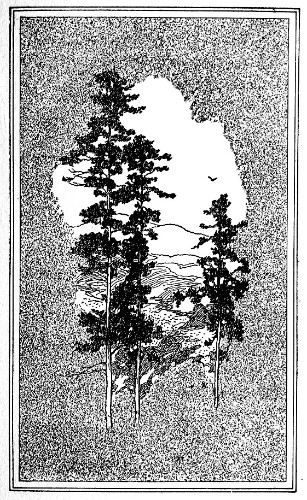
CHAPTER II
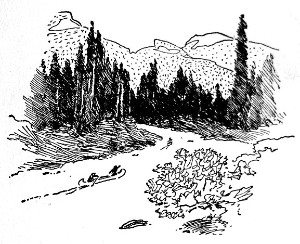
THE rabbit skin was very
light and warm and soft. Jimmy snuggled down in it, and half dreamily
watched
the banks of the river slip past. The tea had made him sleepy. He saw
the Magic
Forest through a haze, and the great trees and the little trooped by
solemnly
like an army with banners. Before him the lithe bowsman swung his
paddle tirelessly.
The whispering swish swish
of the water lulled him. At this early moment
in a strange adventure little Jimmy might have fallen sound asleep had
not a
diversion aroused him
.
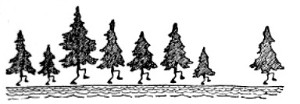 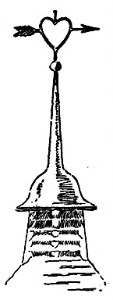

The leading canoe suddenly
stopped short, worked noiselessly sideways, and came to rest against
the bank.
The other canoes joined it. No
word was
spoken, and Jimmy was warned by an expressive gesture to keep silent.
After a
moment Ah-kik, the bowsman, drew from a long greasy case a musket bound
in
brass. The canoe crept forward around the bend.
Not a drip of water broke
the absolute stillness. Makwa, although Jimmy could not see him, was
still
paddling without raising the paddle from the water, and indeed with a
barely perceptible
motion of the wrists. To the little boy's imagination the craft seemed
suddenly
to take the character of a wind vane he had watched from his windows,
turning
to right, to left, swimming across the cloud-strewn ether as though
guided by a
will of its own.
Something exciting was going
on. He did not know what it was, but his eyes grew large and bright,
and he
held himself so still as hardly to breathe. Now it became evident that
the
canoe was quietly but steadily approaching a certain point on the shore
where a
little sandy beach and a grass plot interposed between the
forest and the
river. A broad maple tree rose just outside the edge of the woods,
under which
lay a deep shadow backed by the dusk of the forest. Nearer and nearer
the canoe
crept. And then suddenly, as though it had been evoked by the wave of a
magician's wand, Jimmy saw that the deep maple shadow had a living
tenant.
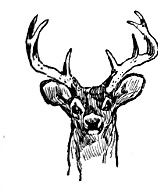
And even then he could not
realize that he looked on a deer. This had the graceful shape of the
creature,
to be sure, but it was so exactly the color of the maple shadow that it
seemed
to be the unsubstantial ghost of a deer, as though one could
see through it as
through a clouded glass.
The excitement in Jimmy's
little breast was intense. His heart thumped, his breath caught in his
throat,
and in spite of his best efforts he trembled all over as though with a
violent
chill. Each moment he expected to see the deer run away. But still the
canoe
slipped silently forward as idly as a leaf wafted thither by the wind.
Then all
at once, when the prow was actually within a few feet of the bank,
Jimmy was
conscious of a violent trembling. Makwa had thrust his paddle down to
stop the
headway. Ah-kik, still unobtrusively, without abrupt motions, raised
the
brass-bound musket.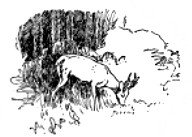
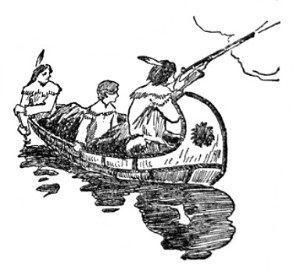
A sudden roar broke forth, a
cloud of white smoke enveloped the bow, the canoe leaped
backward
like a spirited horse.
Makwa dropped the paddle
aboard with a clatter and stretched his arms. Ah-kik called back
something in
his natural voice. From around the bend streamed a flotilla of canoes.
The
everyday sounds after the period of strained silence and patient
endeavor
seemed almost profane.
Jimmy leaped ashore with his
companions, fully prepared to exult over a dead deer. What was his
disappointment
to discover only four deep, sharp footprints where the
animal
had leaped. Evidently the shot had
failed.
But Jimmy had still a long
way to go before the rudiments of his woodcraft should be complete. He
did not
know that Ah-kik could tell by the way the deer carried its tail
whether or not
the animal was wounded, and how badly. And so he was much surprised
when two of
the young men returned after some minutes carrying the venison.
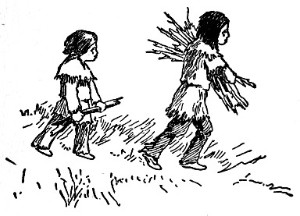
In the bustle of making camp
Jimmy was for some time unnoticed. Certain of the men cut up dry wood.
Old
women swiftly built little fires of birch, touchwood, bark, and twigs.
Even the
little children busily collected and carried in the wood chopped by the
men.
The deer was quickly skinned and cut up. Pots bubbled and steamed over
little
fires. Dogs yelped with delight as bits of offal were tossed them.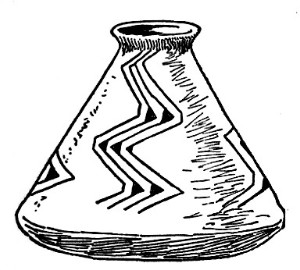
Then when the first tasks
were over, he was surrounded. The younger children
stared at him wide-eyed,
the older teased him; but as he did not
understand what they
said, this did
not worry him in the least. One handsome little fellow
slightly older than
himself smiled at him, and when Jimmy smiled back, he promptly drove
the others
away. Then he squatted on his heels at Jimmy's
side.
"Minne-qúa-gun,"
said he, picking up a tin cup. And so Jimmy learned his
first Indian word.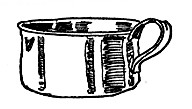
In this was a new and
delightful
occupation. To speak real Indian words was an accomplishment
Jimmy would have
reverenced in another. And here was a chance to
learn for himself. He
memorized tschimon,
the canoe; and ah-boo-é,
the paddle; and ah-gáh-quit,
the axe. Then he resolved to
find out something useful to himself. He
hugged his arms close about his chest, shivered violently, and looked
inquiringly toward his companion.
"Kss ina," said
the latter at once.
Jimmy immediately ran to old
Makwa, who was smoking a pipe on a fallen tree.
"Kss
ina," said he, pointing to his thin
night-dress and his bare shins. "Kss ina, kss ina!"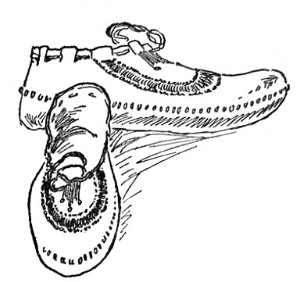
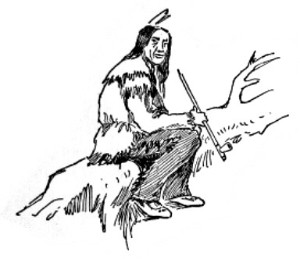
Makwa laughed, his fine old
face wrinkling in a hundred deep little lines. He called
sharply. An old woman
came forward. Makwa spoke a few words to her, whereupon she went away
for some
moments, only to return bearing a bundle wrapped in canvas which she
laid at
Makwa's feet.
The bundle when opened was
found to contain a variety of things. Makwa picked out a little
deerskin shirt,
a pair of blue leggings made of stroud, two squares of blanketlike
material
called duffel, and a pair of deerskin moccasins.
The
squares he wrapped about Jimmy's feet in place of socks, the
leggings he bound with a pair of heavily beaded garters,
the
deerskin shirt he slipped on deftly, and
fastened with a worsted sash. When arrayed in them, the little boy was
too
happy to sit still.
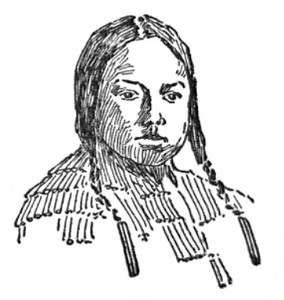
But now the meal was cooked,
Jimmy discovered that he was very hungry. He sat
with a group of women
and children, and accepted thankfully his share of venison, fish, and
tea. A
little girl sat next to him, a pretty little brown thing with big, soft
eyes.
She gazed at him solemnly during the meal.
At last he nodded and smiled
at her, whereupon she showed all her teeth in the prettiest fashion in
the world.
Jimmy, with a full stomach, began to feel very contented. The sun was
warm, the
people about him looked on him kindly, this open-air meal under the
greenwood
tree was inexpressibly thrilling to his young imagination.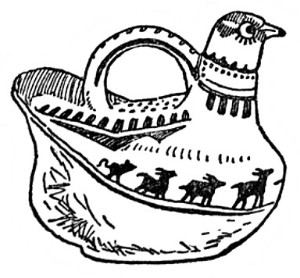
That
afternoon he was given a short paddle and set
to work. Nor was the paddling a matter of play merely. When his
unaccustomed
little wrists and shoulders became very tired, old Makwa sternly
forbade him to
rest. He was compelled to keep on, although his arms at times seemed
ready to
drop off, and his efforts could certainly have added little to the
speed of the
canoe. However, twice the party disembarked on the beach, drew the
canoes up,
unloaded all they contained, and set off through the forest, carrying
packs.
Here, too, Jimmy was given his share to carry, and his thin moccasins
were
slight protection to his feet, which speedily became bruised and wet.
However,
the life and mystery so filled Jimmy's mind that he only partly noticed
these
things.
Of course the trees were
still bare of leaves, but the spring was awakening. All sorts of noises
sounded
through the woods. Jimmy did not know what they were, but little by
little he
learned from Taw-kwo, the young boy.
"Bump! bump! bump!
bump! br-br-rr-r!"
boomed a hollow wooden note.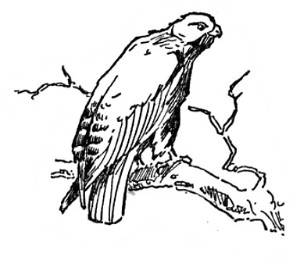
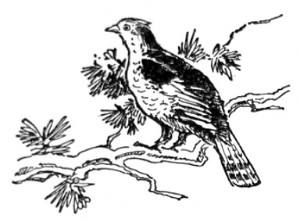
"Penáy,"
said
Taw-kwo. Some
days later a partridge
was flushed into a tree. "Pe-náy," said
Taw-kwo again, and so
Jimmy knew that penáy was a large bird
with a fan-tail
whose capture was most desirable, and who made remarkably good eating.
But he
did not know the English name for it.
In this fashion he acquired
much information about the woods which he would have found
quite valueless in
the towns, for the simple reason that he would have been unable to tell
any one
about it. The hawk, the rabbit, the squirrel, the muskrat, the jay, and
many
others he learned thus. Of course he could not always
remember, but Taw-kwo
was patient in repeating, and Jimmy was just of the age to learn
quickly by
absorption.
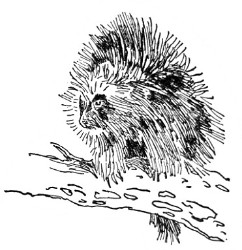
On the way
back through the
woods for a second load on the second carry, Jimmy saw his first live
porcupine. The beast was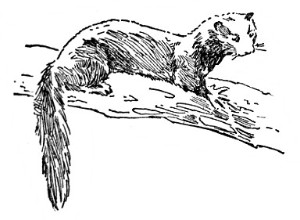 scornful and
lordly, and disinclined to hurry in the least, after the manner of
porcupines
everywhere, but to Jimmy a wild animal of this size which would permit
itself
to be approached, was a brand-new experience. Of course he wanted to
kill it.
That is invariably the first instinct. But May-may-gwan, the soft-eyed
little
girl, would not allow him to do so. Jimmy learned thus his lesson in
woods
moderation, for the woods Indian never kills wastefully.
scornful and
lordly, and disinclined to hurry in the least, after the manner of
porcupines
everywhere, but to Jimmy a wild animal of this size which would permit
itself
to be approached, was a brand-new experience. Of course he wanted to
kill it.
That is invariably the first instinct. But May-may-gwan, the soft-eyed
little
girl, would not allow him to do so. Jimmy learned thus his lesson in
woods
moderation, for the woods Indian never kills wastefully.
The rest of the afternoon
the canoes floated down the river. The shores glided by silently. Jimmy
many
times forgot the ache of his shoulders in the excitement of a swiftly
vanishing
wing, the mysterious withdrawal of some brown spot that, in
this manner only,
proclaimed itself a forest creature. Once a mink bobbed up for a moment
on a
piece of driftwood, and paused, its forefeet under its chin,
to stare
malevolently at them as they glided by. Often the muskrats would be
seen
swimming in arrow-shaped ripples.
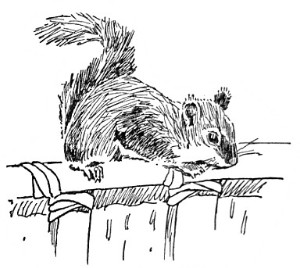
Once a
slim, graceful animal
of some size slipped from a rock ledge ahead. This the Indians thought
important enough to discuss, gathering their canoes into one idly
drifting
bunch. For it was nigig, the otter,
and the value of his pelt in the winter won him consideration
as a personage.
Often squirrels crossed the river, steering themselves with their bushy
tails.
Makwa, noting the interest of the boy, good-naturedly extended his
paddle to
one of the little animals, whereupon, to Jimmy's vast delight, it
scrambled up
the paddle to the gunwale within two feet of his hand, where it sat
resting for
a moment, and then plunged into the water again.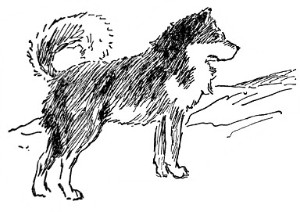
About the middle of the
afternoon the women's canoes were permitted to go ahead for the purpose
of
making camp, so that by the time the sun was low the men were enabled
to draw
ashore for the night. A number of little birch-bark shelters were
already in
place, the tiny fires were winking bravely, the dogs were
squatted in a
semicircle just at the edge of the brush
awaiting their share
of the
meal.
Jimmy thought he had never
seen such funny dogs. Their noses and
ears were pointed, their hair long and thick, and their tails as furry
as a
fox's brush. He tried to make friends with them, but they snarled at
him so
savagely that he drew back alarmed. In after days he succeeded in
knowing them
better, but now they were distrustful. They were
more
than half wolf, with the wolf's fierce instincts.
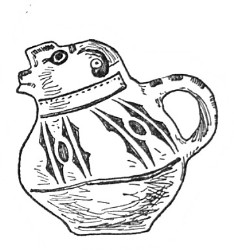
But now Taw-kwo
touched him
on the shoulder, smiling and motioning him to follow. He did so. The
two boys
picked their way through the brush to the mouth of a little creek
flowing into
the river. There Taw-kwo unrolled a finemeshed net he was
carrying, fastened
one end to a staff which he braced upright in the bottom, waded across
and
stuck the other end in a similar manner, so that the mouth of the creek
was
entirely closed by the net. Taw-kwo did not seem to mind in the least
wading in
the cold water with his moccasins and leggings on. "Kee-gawns," said
he, making with his hand the motion of a fish swimming.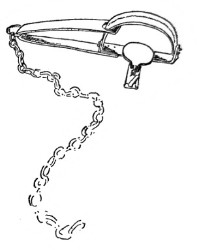
He
touched his finger to his lips to enjoin caution.
Stealthily he lay on his stomach and crawled to the sharp edge of the
bank.
Jimmy followed his example and peeped over. Below his eye ran five or
six grooves
through the thick water-mud which ended in a regular gallery
of holes. And
just as Jimmy looked, some bright-eyed, solemn, whiskered animal seemed
to fade
into hiding. "She-shesk,"1
whispered Taw-kwo. He signed
to Jimmy to remain, and returned shortly
carrying two steel traps. These he set
at the mouths
of the grooves, covering them craftily with mud, and touching none of
the
surroundings with his hands.
At camp by this time the evening
meal was
prepared. Jimmy had never been so hungry, in his life. He ate and ate
until he
could not cram down another mouthful, and he was almost too lazy to
move over
to the larger fire, or to hang up before the blaze his moccasins and
duffels as
did the others. The flames leaped, making shadows on the Magic Forest.
Over in
its depths a night-bird began to moan whip-poor-will. The dogs
sat on their
haunches blinking their eyes. Men smoked and laughed and talked. Women
conversed in low voices.
Little May-may-gwan
sat beside him and held his hand.

After a long time Taw-kwo led him
to
a
shelter in which was spread six inches of balsam browse. The Indian boy
laid
out the rabbit-skin robe. The balsam smelled good to Jimmy. His eyes
grew
heavier and heavier.
But he was not to sleep yet.
Suddenly a tremendous row brought him to his feet. The dogs were
clamoring,
excited figures were running past the firelight. Jimmy instinctively
thrust his
feet into his moccasins and followed.
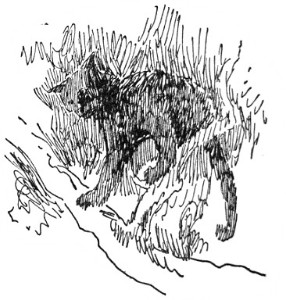
Down
through the tangled
forest the chase went pell-mell, the dogs always in the lead. Some of
the Indians
had snatched up torches. Stumbling, shouting, clambering, breathless,
the
multitude streamed through the silent dark. Then it bunched at a slim
tree
about which the dogs were leaping frantically. Jimmy could
distinguish a
fierce-eyed dark animal, about the size of a dog, crouched in the
branches. The
little boy was still half asleep.
What
followed was much confused. Something dislodged the
lodged
the beast. It fell among the dogs. Immediately there was
a great fight, in which the Indians seemed to be trying desperately to
deliver
a telling blow. Then it was all over. Two of the dogs were dead; from
others
blood was streaming. One of the Indians was tying a bandage
around the calf of
his leg.
Back
through the ancient forest filed the convoy with
its prey. At the fireside Jimmy saw that the beast was powerful, blunt
nosed,
with long claws, "Swingwadge," replied Makwa to his look of
inquiry.
Many years after Jimmy again saw one of them stuffed at the Sportsman's
Show,
and so knew that he had assisted at the killing of a carcajou, the
fiercest
fighting animal for its size in America. And thus closed what he always
thought
of afterward as his Wonderful Day.
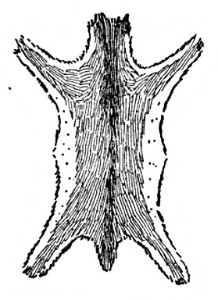
____________________
1
Muskrat.
 Click the
book image to turn
to the next Chapter.
Click the
book image to turn
to the next Chapter.
|

